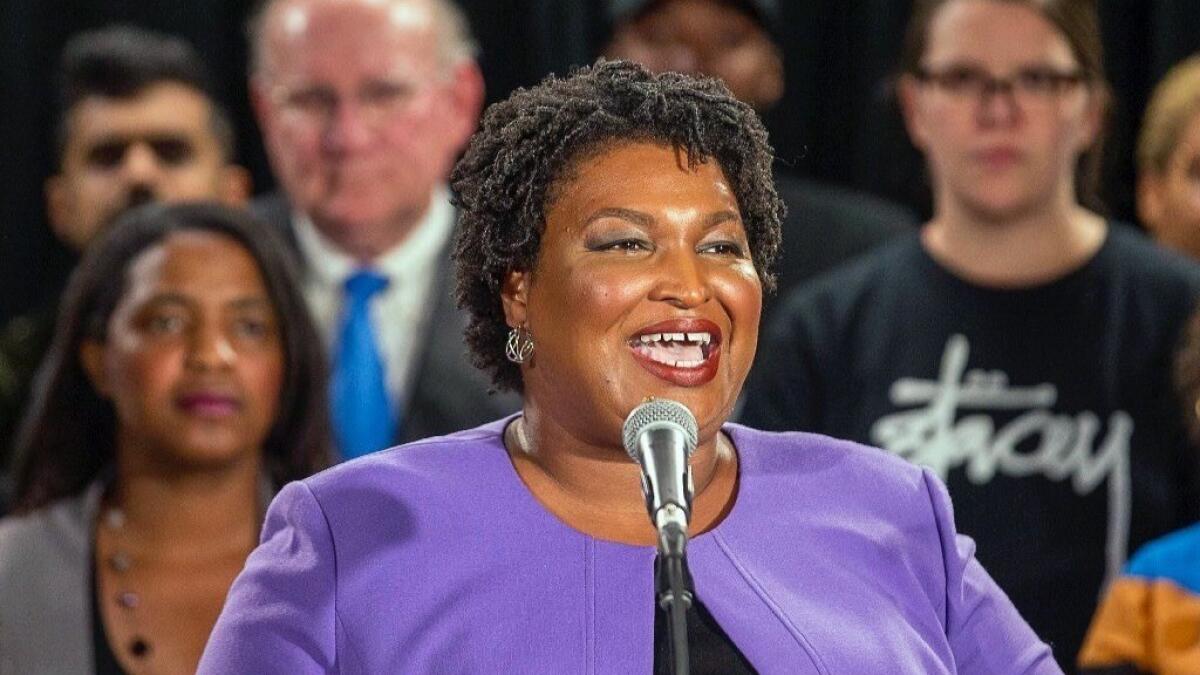Stacey Abrams weighs in on abortion bans, boycotts and California

Stacey Abrams, the rising Democratic star who narrowly lost a bitterly contested race last year for Georgia governor, launched a campaign this week to urge opponents of the state’s stringent new abortion ban to donate to local groups fighting for reproductive rights.
Since Gov. Brian Kemp signed the law last week, a succession of Hollywood actors and filmmakers have urged major studios to boycott Georgia’s robust film production industry. Georgia women working in film have pushed back, countering that Hollywood should invest in local campaigns.
The Los Angeles Times asked Abrams, 45, a former state representative who is currently weighing a bid to run for president, about the law, the value of boycotts and California’s role in pushing for political change in the South. This interview has been edited for clarity and length.
Georgia is one of several states that has passed a near-total abortion ban. As Hollywood celebrities call on major film studios to pull out of the state, what do you think is the path ahead?
We have to recognize that Georgia is the only state that is such a deep part of the film industry that also has the type of draconian leadership that would seek to strip a woman’s autonomy in this way. That puts us in a unique position to fight back — not only against the legislation here but the legislation around the country — and to fund the defeat of these politicians and their horrible behavior by using the resources available through the entertainment industry.
The only long-term solution to the crisis we’re facing now is to anticipate what will come next. And what will come next are elections, in 2020 and 2022. What will come next is litigation. And in both of those places, investment in the groups on the ground doing this work is the strongest play that we have to make certain that we can protect the rights of all.
What do you think of boycotts?
As a daughter of the South, I know boycotts have been instrumental in securing the rights that I hold dear. And I’ve seen them work in recent years. But I do believe that, in this instance, Georgia’s in a very different position, in part because these laws are proliferating across the country, including next door in Alabama.
Unlike recent conversations about boycotts, in North Carolina and Indiana, what’s happening right now is a concerted effort across a range of states, from Ohio and Indiana to Alabama and Georgia, to push these laws.
While I understand the calls for a boycott in Georgia, I’m going to follow a different path. I think the superior opportunity for Georgia, in the specific, is to actually use the entertainment industry’s energy to support and fund the work that we need to do on the ground because Georgia is on the cusp of being able to transform our political system.
Those who push for boycotts argue that applying economic leverage to the state is a more effective way to bring about change. How effective do you think a boycott would be?
I believe that people should follow their values and if they believe that the refusal to invest makes sense, I understand that.
While an industry boycott could have an effect, it will not have the effect of actually stopping the laws. We have to recognize that the men who are pushing this law — and it’s mostly men — they truly do not care about the lives of those they are affecting, and they are not to be persuaded by an economic boycott. In fact, if you listen to some of the pundits who’ve been on the air, they say, ‘Let’s let Hollywood boycott us.’ Because they think it actually makes them look stronger at home.
So they would benefit from a boycott, but they also are quietly trying to keep these companies here. That’s one of the reasons you see the current governor of Georgia trying to go out under the cover of night to go and shore up his support in California. He understands that investment in the state of Georgia, no matter where it comes from, helps families here in Georgia.
The problem is he wants to have it both ways. There’s a cynicism to the Republicans to think that they can drive out the progressive voices of the entertainment industry, but keep the money. And I think that’s completely wrongheaded. My hope is that we demonstrate that that is not going to be permitted.
Do you think it hurts liberal causes in Georgia and other Southern states when folks in Los Angeles and other blue enclaves weigh in on deeply-polarized cultural and political issues?
No, not at all, because we live in a single country and this is not a conversation that is endemic to Georgia. Georgia happens to be uniquely positioned at the nexus between the attack on abortion rights and the economic impact of the entertainment industry. But we have to understand that these bills are part of the strategic efforts to overturn the rights of women for the entire country.
So while I am absolutely focused like a laser on Georgia, I also recognize that I’m part of a national battle for the rights of women. I don’t care what state you’re in. Stripping women of their rights is wrong. Whether the support for our efforts to overturn this law comes from the Deep South or the Midwest or the West Coast, it is a common cause that we have together.
Yes, there is going to be an attempt to characterize the concern about this law as something that is outside the mainstream of Georgia, but that’s completely wrong. More than 60% of Georgia voters support abortion rights. What is wrong is that we have leaders that are not reflective of the voices and values of our state.
During your gubernatorial campaign, Republicans tried to paint you as a radical who would bring California values to Georgia. Why do you think Republicans keep going back to that argument?
It’s an attempted trope, much like many of the other tried and true tropes in politics that have no effect on voters. Americans invested in our campaign because they understand that Georgia is the eighth largest state, one of the fastest-growing economies, and what happens in Georgia matters across the country.
There are two very polarized sides on this abortion issue. Is there any potential for compromise?
There is no need for compromise. Women have the right to control their bodies. What is happening now is an attempt to roll back bodily autonomy. What is happening now is an attempt to roll back a generation of history. And it is wrong on its face.
My belief is that we have an obligation to defend the rights of women, the rights of families to make healthcare decisions and the rights of doctors to provide care. Any laws that weaken those opportunities and those responsibilities should be fought tooth and nail.
What Republicans have done is tried to create a false narrative based on spurious science, but most importantly, based on cynical politics. They believe that they can win elections by creating false ideas and by pushing out what we know to be fiction. And the minute we decide to compromise with fiction, we are lost.
Some women in the South have accused Hollywood stars calling for boycotts of coming from a place of privilege and not listening to women on the ground. What do you think?
I am deeply grateful for those who have called for a boycott out of solidarity and because it’s a reflection of their values. I think it’s an important position to take. In my mind, we need to recognize that this should not be a fight between allies. We may have different strategies, but our goals are the same. That common cause we have is what’s most important.
Our fight is not with one another. Our fight is with those who would strip us of those rights. My position is grounded in my presence here and what I see is the most-effective strategic way to achieve our common goal. But I respect those who look at the history of our country and see another path.
A few weeks ago, you announced you would not run for U.S. Senate. Why are you taking so long to decide whether you will run for president?
I want to make certain that the issues that matter most to me are being pushed. Fundamental is the issue of voter suppression, because every other right we have is guaranteed by our access to the ballot box. Clearly, I am deeply concerned about healthcare, and that runs the gamut from fighting back against these horrific laws that are being put on the books across the country to making certain that every American has the right to healthcare.
I want to ensure economic security — that everyone has the opportunity to work and to take care of themselves and their families. And undergirding that are conversations about education and criminal justice reform. Those are the issues that I’m going to be looking for and listening to as I watch the debates unfold.
I want to make certain that we have the right strategy for victory — a strategy that is not to turn around defeating a single person, but more importantly about pushing for the values that we believe will win America. That’s going to be what I look at. And if we don’t have that, I will run if I think I can win.
More to Read
Get the L.A. Times Politics newsletter
Deeply reported insights into legislation, politics and policy from Sacramento, Washington and beyond. In your inbox three times per week.
You may occasionally receive promotional content from the Los Angeles Times.







